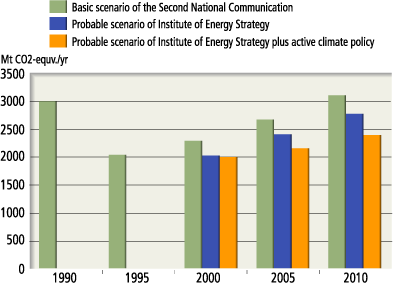|
|
|||||||
|
|
|||||||
I. Title of the Best PracticeLaw Regulations, Federal Programs and Project Avtivities
|
||||||||||||||||||||||||||||||||||||||||||||||||||||||||||
| 1998-2005 | I stage 1998-2000 |
II stage 2001-2005 |
At the year 2005 |
|
| Energy saving, M t.c.e. | 365-435* | 53-69 | 312-366 | 88-102 |
| Reduce in energy intensity in comparison with 1995 | 13.4% | |||
| Total investments, billion $ | 9.22** | 2.5 | 6.72 | |
| Cost of saved fuel (prices of 1995), billion $ | 24.3-28.0 | |||
| Economic efficiency of the Program | 2.6-3.0*** | |||
| Estimated CO2 emission reduction, Mt CO2 **** | 700-900 | 100-150 | 600-750 | 150-200 |
| * Here and below ranges reflect different versions of Program implementation | ||||
| ** Exchange course of the beginning of 1998 (6 Russian Rubles = 1 US$). | ||||
| *** Ratio: cost of saved fuel divided by total investments. | ||||
| **** Detail emission reduction estimates are absent in the Program.Our estimations are based on fuel consumption structure and the following values: saving of 1 t.c.e of natural gas = 1.6 t of CO2 emission reduction, 1 t.c.e mazut = 2.25 tCO2, 1 t.c.e. coal = 2.8 tCO2. | ||||
The program covers all types of energy saving. Total budget as large as about 9 billion $, including 7.8 billion $ for capital investments and more that 1 billion $ for R&D. However only 3% from the Federal budget, 20% from regional budgets and regional funds of energy saving. The main sources are commercial credits (30%), means of energy enterprises and market instruments.
Total energy saving is fuel saving of up to 430 Mt.c.e. in 8 years (1998-2005). Payback period is usually very short - 1.5-2 years. Additional benefits are solution of subsidiary problems and reduce of some gas and power tariffs by 8-13%.
The program has five subprograms:
1. Saving in fuel-energy complex (power stations, gas and energy distribution systems, etc.) - 2.8 billion $.
2. Utilities (district heating, heat and energy supply of end consumers) - 2.8 billion $.
3. Measures in industry - 1.5 billion $
4. Development and promotion of energy saving equipment - 1.1 billion $.
5 Special activity for implementation of energy, gas and heat meters - 1 billion $.
On the first stage (1998-2000) just 5th subprogram - wide implementation of meters and accounting systems is anticipated as very beneficial. There are additional large ecological effect (reduce of atmospheric pollution and water use), potential prevented damage is estimated as 6 billion $.
It is necessary to notice that adopted Energy Saving Program has not dogmatic character. The Program will be changed gradually, in relation with changes in economic and political situation.
There is also a number of other Federal Programs related to Addressing Climate Change activities and among them:
"Prevention of Dangerous Climate Changes and Their Negative Consequences"
"National Technological Base"
"Safety of Population Related to Risks of Natural and Technogenic Catastrophic Events"
"Ecologically Clean Technologies and Transport"
"Ecologically Clean Processes in Chemical Industry"
"Waste Management"
"Russian Forests" and others.
All the programs are under implementation but have limited financial support.
There is a practice in the Russian Federation to implement municipal programs on energy efficiency improvements in district heating systems and water supply systems. For example, the Moscow Center for Energy Efficiency (independent non-profitable organization) developed such programs for 8 Russian towns: Dzerzhinsk, Zheleznogorsk, Zhukovsky, Zelenodolsk, Kostroma, Lytkarino, Murmansk, Chelyabinsk, Orel. Each of the programs includes four sections: boilers, heating networks, enterprises and office buildings, dwelling buildings. In the frame of the Federal Program "National Technological Base" there are under development new types of technologies for energy efficient buildings.
OAO "Gazprom" (Russian huge gas company) implements a number of programs related to improvements in gas transportation systems, loses of natural gas and methane leakages.
The Russian Methane Center (Kemerovo) provides support for coalbed methane projects in Russia.
A number of projects have been implemented and are planned to be implemented regarding the waste management, including:
- solid waste burning in Moscow Region
- processing of sewage waters (Tver, Saransk)
- processing of livestock waste in Tver and other of regions
- biofuel projects.
The Russian National Pollution Abatement Facility (State Committee for Environmental Protection) developed a portfolio of projects in addressing climate change for a number of economic sectors, including oil and gas industry, metallurgy, coal mining industry, etc.
The Ministry of Sciences and Technologies of the Russian Federation provides an information base on results of scientific and technological research works in the Russian Federation, which includes descriptions of hundreds new technological projects practically in all economic sectors.
| Detailed Description of Best Practices - Russian Federation No.2 | ||||||
|
|
||||||
|
|
||||||
|
|
||||||
